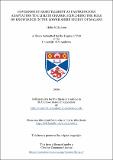Files in this item
Government resettlement as participatory adaptation to climate change : exploring the role of knowledge in the Lower Shire region of Malawi
Item metadata
| dc.contributor.advisor | McCollum, David | |
| dc.contributor.advisor | Laurie, Nina | |
| dc.contributor.author | Nicholson, Hebe | |
| dc.coverage.spatial | xii, 274 p. | en_US |
| dc.date.accessioned | 2020-09-14T09:45:22Z | |
| dc.date.available | 2020-09-14T09:45:22Z | |
| dc.date.issued | 2020-12-01 | |
| dc.identifier.uri | https://hdl.handle.net/10023/20615 | |
| dc.description.abstract | There has been debate over how environmental change will influence migration. This PhD explores one aspect of this: the impact of flooding on migration patterns and the subsequent move by government actors to govern these migration patterns through resettlement in Malawi. This research suggests that this move to govern migration reflects a broader shift in the discourse of seeing migration as a positive opportunity and as adaptation to environmental change. It focuses on the Lower Shire region of Malawi, an area particularly impacted by flooding, and especially reflects on the participatory nature of the resettlement process, as this is highlighted by influential international guidelines as being necessary for the resettlement to be adaptive rather than mal-adaptive. To this end the research focuses on the knowledges involved and the varying power dynamics. Fieldwork occurred between August and November 2017 and consisted of 48 Interviews and six focus group discussions with three communities in the Lower Shire that had three different attitudes (unwilling, undecided, and resettled) towards resettlement. As well as 21 interviews with stakeholders in government and NGOs involved in these communities and in the resettlement process at a national and district level. The data showed that flooding related movements already occur in the communities but, due to the increasing severity of flooding, there is a growing desire by those in government and NGOs to initiate their own resettlement. However, official resettlement due to flooding is novel in Malawi, and there is confusion over what it entails and who is involved. This appears to lead to a disconnect between Resettlement, established by the government and resettlement, movements initiated by those in vulnerable communities. The data suggests that a key reason this disconnect develops is due to the different perceptions of knowledge. It appears that there is a subtly pervasive disregard of community knowledge and this can reduce the community agency within the resettlement process and prevent it from being participatory. However, the data also highlighted the intriguing ways the communities themselves can re-appropriate resettlement to indicate their needs in the process, illustrating the fluidity of knowledge and power within the resettlement process in Malawi. | en_US |
| dc.description.sponsorship | "This work was supported by the Scottish Graduate School of Social Science as part of the Economic Social Research Council [1649125]." -- Funding | en |
| dc.language.iso | en | en_US |
| dc.publisher | University of St Andrews | en |
| dc.relation | Interview transcipts with stakeholders in government, NGOs and rural communities in Malawi (thesis data) Nicholson, H., University of St Andrews, 18 March 2020. DOI: https://doi.org/10.17630/6336d9c7-bb04-4a1c-b08a-8d1dde39c41f | en |
| dc.relation.uri | https://doi.org/10.17630/6336d9c7-bb04-4a1c-b08a-8d1dde39c41f | |
| dc.rights | Creative Commons Attribution 4.0 International | * |
| dc.rights.uri | http://creativecommons.org/licenses/by/4.0/ | * |
| dc.subject | Resettlement | en_US |
| dc.subject | Climate change | en_US |
| dc.subject | Participatory | en_US |
| dc.subject | Flooding | en_US |
| dc.subject | Local knowledge | en_US |
| dc.subject | Technocratic knowledge | en_US |
| dc.subject | Malawi | en_US |
| dc.subject.lcc | QC903.2M2N5 | |
| dc.subject.lcsh | Climatic changes--Social aspects--Malawi | en |
| dc.subject.lcsh | Climatic changes--Political aspects--Malawi | en |
| dc.subject.lcsh | Land settlement--Government policy--Malawi | en |
| dc.subject.lcsh | Human beings--Effect of environment on--Malawi | en |
| dc.subject.lcsh | Migration, Internal--Environmental aspects | en |
| dc.subject.lcsh | Floods--Malawi--Case studies | en |
| dc.title | Government resettlement as participatory adaptation to climate change : exploring the role of knowledge in the Lower Shire region of Malawi | en_US |
| dc.type | Thesis | en_US |
| dc.contributor.sponsor | Scottish Graduate School of Social Science (SGSSS) | en_US |
| dc.contributor.sponsor | Economic and Social Research Council (ESRC) | en_US |
| dc.type.qualificationlevel | Doctoral | en_US |
| dc.type.qualificationname | PhD Doctor of Philosophy | en_US |
| dc.publisher.institution | The University of St Andrews | en_US |
| dc.identifier.doi | https://doi.org/10.17630/10023-20615 |
The following licence files are associated with this item:
This item appears in the following Collection(s)
Except where otherwise noted within the work, this item's licence for re-use is described as Creative Commons Attribution 4.0 International
Items in the St Andrews Research Repository are protected by copyright, with all rights reserved, unless otherwise indicated.


